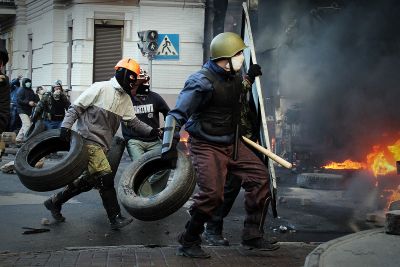Bridges Burnt in Ukraine
Two months ago, Ukraine’s EuroMaidan protests were the biggest pro-European demonstration in history, and in some ways were at the forefront of the battle for Europe’s soul.
February 19, 2014 -
Jakub Parusinski
-
Articles and Commentary

Photo: Wojciech Koźmic
A month ago, it was a fight for freedom and against the authoritarian president Viktor Yanukovych. Now, as the Internal Army troops continue to move down into the Maidan, it has become a fight for the survival for the Ukrainian nation.
There are no words that can adequately describe what is happening in Kyiv, but it feels very much like hell. The city centre is burning, whether it is the burning of the barricades protecting protesters, the Trade Union building set ablaze by the police or the tents that were engulfed in flames after canisters used to fill Molotov Cocktails caught fire. Beyond the Maidan, in the shadows, Berkut and hired thugs known as titushki await the unsuspecting, ready to beat or shoot those who stray too far.
Talk of compromise now seems deluded. As the death toll continues to climb, it seems that there is no way to breach the divide between the president and the people he has declared a war upon. Negotiations between the president and the opposition leaders have produced nothing but further threats. As buildings continue to be seized in the country’s west and the violence spreads, it seems that the only question is how many more victims there will be, and what Ukraine we will find once the dust settles.
In hindsight, though, it almost seems inevitable. Since the beginning of the crisis, the president has shown no appetite for compromise. The resignation of Prime Minister Mykola Azarov, which came in the wake of clashes on Hrushevkoho Street, only saw him replaced with Serhiy Arbuzov, a member of Yanukovych’s inner circle. The so-called amnesty laws absolved government forces, including the scapegoats for the initial November 30th crackdown on the peaceful protests, while activists were placed under house arrest and continued to face charges.
Talk of constitutional reform was dismissed, with the ruling Party of Regions members rejecting any debate and proposing to hand the matter over to committees that would stall the process for months and finally hand it over to a Constitutional Court packed with presidential loyalists. Many diplomats, including United States Ambassador to Kyiv Geoffrey Pyatt, have put the blame for the current bloodshed squarely on Yanukovych.
The blunt truth is that Yanukovych had long robbed his citizens, particularly those on the Maidan, of their futures. After the arrests, the disappearances and the finding of the tortured body of Yuriy Verbitsky in a frozen forest outside Kyiv, it became clear that the protesters were doomed if they lost. At best, they and their families would face persecution; at worst, they would be threatened with a brutal death.
It should also be clear that the reason why Yanukovych has felt free to act with such impunity, other than the billions coming from Russia, is the feeble response from Western governments. While the United States had imposed limited visa sanctions previously, the European Union dawdled, with some leaders even claiming that sanctions were not on the table. Neither was any kind of forceful dialogue during negotiations. Indeed, the EU could only summon itself to float a possibility of membership, perhaps, at some point, maybe.
Sanctions are by no means a panacea for Ukraine’s problems. But if the pressure had been applied at the right time, when Yanukovych’s grip over his party was slipping, it may have forced the parties to a compromise. Now, visa bans and asset freezes can provide punitive retribution, but it seems that the oligarchs have already been subdued into submission, as have members of the Party of Regions.
In a sense, the EuroMaidan protests were a uniquely manageable crisis. Although the opposition leaders had largely shown incompetence on a strategic and tactical level, they were always open to dialogue and compromise. The protesters, too, remained level-headed even after the first deaths, and showed great restraint by freeing the city hall and the passage on Hrushevskoho Street. There was no volatility compared to the Arab Spring. After two months of violence and abuse, protesters continued to police the streets, preventing vandalism and violence and bringing caught thieves to police headquarters knowing they would be charged and likely arrested.
Sadly, it seems that those days are irrevocably gone. There are protests in the east, albeit mostly passive ones, and the west is rising up in insurrection; Ukrainian officials and the Russian media continue to tout the line of an anti-terrorist operation being carried out; traffic police with AK-47s patrol the locked-down streets.
This is now a city, and a country, at war. It now seems beyond the grasp of even the best European diplomats, and energy should now be devoted toward bringing United Nations peacekeepers, with the threat (and readiness to follow through on) of international prosecution if need be.
But time is running out. Ukraine is burning.
Jakub Parusinski is Chief Editor of the English-language weekly Kyiv Post and a contributor to New Eastern Europe‘s Unravelling Ukraine column.

































